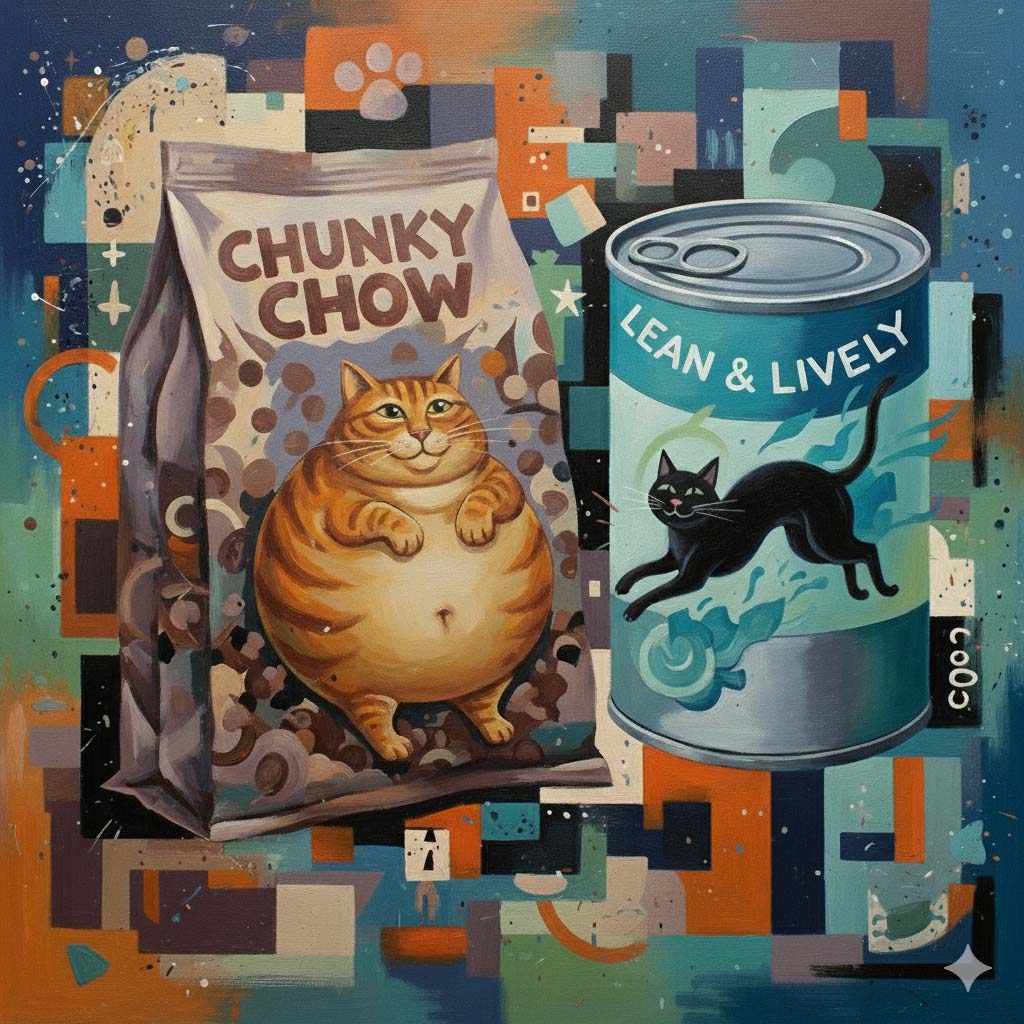As cat owners, we prioritize our feline companions’ well-being, and nutrition plays a crucial role. The debate between wet and dry cat food persists, but canned food often benefits cats, especially those with health concerns.
At Savannah Veterinary Internal Medicine, we specialize in complex conditions and observe the significant impact of proper nutrition, especially increased moisture intake, in preventing and managing diseases in cats in Savannah, Pooler, and Richmond Hill.
The #1 Benefit: Moisture, Moisture, Moisture!
Domestic cats evolved from desert-dwelling ancestors that got most of their hydration from prey. Their naturally low thirst drive often prevents them from drinking enough water to compensate for a dry diet. For optimal health, a cat needs about one ounce of water per pound of body weight daily.
Dry Food: Typically contains only 5-10% moisture.
Canned Food: Has much more moisture content: 70-80%.
This difference is critical for several metabolic reasons, especially given the warm, humid climate of Coastal Georgia:
Savannah to Brunswick Climate: As temperature and humidity rise, cats cool themselves by sweating from paw pads and through breathing. This process is inefficient and energy-intensive, consuming moisture and risking dehydration. Consistent, high-moisture intake through diet is crucial for maintaining their core body temperature and well-being in this region.
Kidney Health: Chronic Kidney Disease (CKD) is one of the most common feline geriatric diseases we treat at Savannah Veterinary Internal Medicine. Considering the challenges cats face in our warm environment, as we just discussed, maintaining optimal hydration is even more critically important for kidney health in Coastal Georgia cats.
Canned food’s significantly higher moisture content directly addresses this, providing the continuous fluid balance necessary to:
- Support kidney function by easing the burden of concentration.
- Help flush toxins more effectively.
- Maintain healthier blood flow to the kidneys.
Proactive hydration supports kidney health better than relying on a cat’s insufficient thirst drive, especially when they work harder to cool themselves. In advanced CKD, owners may notice signs of polydipsia (excessive thirst), like lying beside the water bowl or drinking from unusual places. Their water need may exceed their ability to drink, so obtaining moisture at each meal helps them stay hydrated.
Urinary Bladder Health: Concentrated urine can predispose cats to painful urinary tract issues. The increased water content in canned food leads to a more dilute urine, which helps flush out bacteria and reduce the concentration of stone-forming minerals. If your cat is struggling with litter box issues, you should read our deep dive on Understanding Feline Idiopathic Cystitis (FIC). While Perineal Urethrostomy (PU) Surgery is an option for severe feline urethral blockages, its appropriateness is a frequently discussed topic among internal medicine specialists. This article presents an internist’s perspective on this contemplated measure.
Constipation and Colon Health: Constipation is frequently a manifestation of chronic dehydration, particularly in cats with underlying conditions like CKD. Feeding canned food is the most accessible and easiest way to address this, supplying the fluid needed to keep the colon moist and encouraging regular, healthy defecation.
Tackling the Feline Obesity Epidemic and Type 2 Diabetes
Canned food, which naturally has a higher protein content and lower carbohydrate content, is similar to a cat’s normal carnivorous diet and is crucial for managing feline diabetes.
Research Update: Studies have shown that diabetic cats fed commercial over-the-counter (OTC) wet food diets were 3 times more likely to achieve diabetic remission than those fed veterinary prescription diets. Also, maintaining cats predominantly on a commercial wet diet was strongly associated with achieving remission without subsequent relapse.
Canned food helps cats feel fuller on fewer calories and provides appropriate carnivorous-required nutrients. This leads to healthier weight management and a reduced risk of Type 2 Diabetes for cats living in Savannah, Pooler, and Bluffton.
Common Food Concerns: Why Canned Food Is Still Better
We understand why many cat owners initially choose dry kibble, and we want to address some common points that often come up in discussions about feline nutrition:
“Dry Food is More Convenient and Affordable.”
It’s true that dry food can be easier to store, less messy, and often has a lower cost per bag. For busy owners, the ability to free-feed or leave food out for extended periods is a definite convenience.
Our Perspective: While convenience and cost are important, consider the long-term health benefits and veterinary costs of chronic dehydration. Investing in preventative nutrition now can save time, stress, and money in the future when managing conditions like CKD, urinary blockages, or diabetes, which are often more costly and complex to treat.
“The Internet Says Dry Food is Good for Teeth Cleaning.”
This is a very common belief, and the idea that crunchy kibble “cleans” teeth has been widely promoted. Some specialized dry dental diets do have unique structures or coatings designed to help scrape plaque.
Our Perspective: Standard dry kibble provides minimal dental health benefits. Cats often swallow it whole or barely crunch it, resulting in little abrasive action. Specialized dental diets are less effective than professional cleanings. Chronic dehydration from a dry-food-only diet often negates the modest dental benefits of generic kibble. Therefore, regular veterinary dental care is the best way to achieve optimal dental health, not just by changing the diet.
Bottom Line: Canned Food “Wins Out” for Overall Feline Health
Despite the perceived benefits of dry food, canned food remains the superior choice for a cat’s overall health, especially in challenging climates like Coastal Georgia.
Canned food provides unmatched hydration, addressing the low thirst drive of cats and supporting their organs, diluting urine, and maintaining a moist digestive tract. This prevents common feline ailments like urinary tract issues and constipation.
Canned food also offers an optimal macronutrient balance, higher in protein and lower in carbohydrates than dry kibble, mimicking a cat’s natural carnivorous diet. This balance is crucial for maintaining lean muscle mass, a healthy metabolism, and effective weight management, reducing the risk of obesity and Type 2 Diabetes.
By providing superior hydration and a species-appropriate diet, canned food acts as a powerful preventative tool against chronic kidney disease, recurrent urinary tract issues, painful constipation, and diabetes, conditions that can significantly impact a cat’s quality of life and require extensive veterinary intervention.
While convenience and cost are factors, from an internal medicine specialist’s viewpoint, the long-term health and well-being benefits of a moisture-rich, species-appropriate diet like canned food far outweigh the advantages of dry kibble for most cats.
The Dangers of Food Switching: An Important Warning
Switching a cat’s diet, especially from dry to wet, must be done slowly and carefully.
Anorexia and Food Aversion: If a cat refuses to eat a new food for even a few days, it can be life-threatening. If your cat is a Beyond “Finicky”: What’s Really Behind Your Pet Not Eating?, we urge you to investigate the underlying cause.
Hepatic Lipidosis (Fatty Liver Disease) is a severe, often fatal, condition that occurs when a cat stops eating for even a short period (sometimes as little as 2-3 days). This requires immediate and aggressive nutritional support. If your cat develops this condition, a feeding tube is often necessary to safely provide the calories and nutrition needed for recovery. You can read more about Using An Esophageal Feeding Tube on our dedicated blog post.
Serving the Feline Health Needs of Savannah, Pooler, and the Lowcountry
For many cats, canned food offers superior hydration, helps manage weight, and supports metabolic health. This can significantly reduce the risk of common feline diseases like kidney disease, urinary tract issues, and chronic constipation—conditions that we at Savannah Veterinary Internal Medicine frequently diagnose and manage.
Always consult with your veterinarian before making significant dietary changes to ensure a smooth, healthy transition for your beloved feline friend. If you have questions about the health of your feline friends, please call (912) 721-6410 or contact us to set up a consultation with our specialists, no referral needed.

Author:
James Woods DVM, MS, DACVIM (SAIM)
Ph: (912) 721-6410
Contact Us
